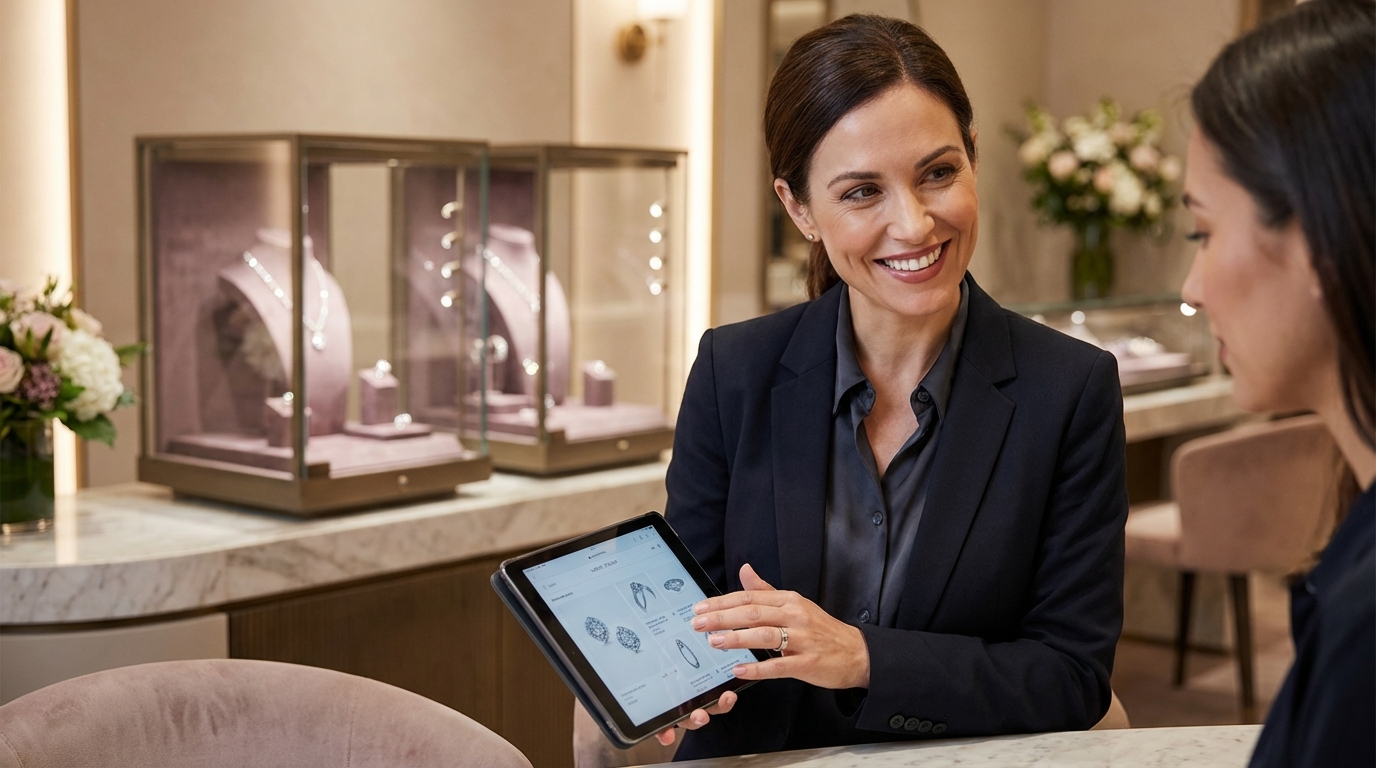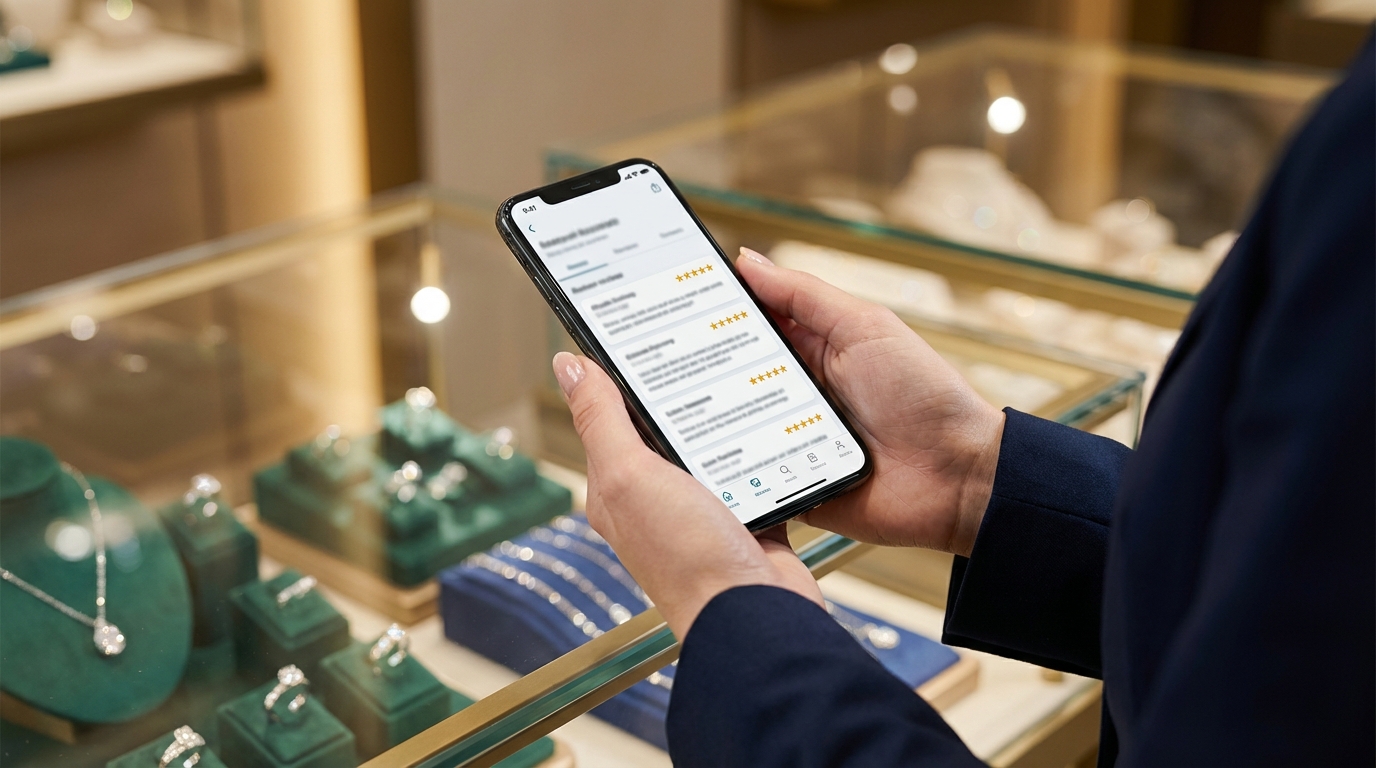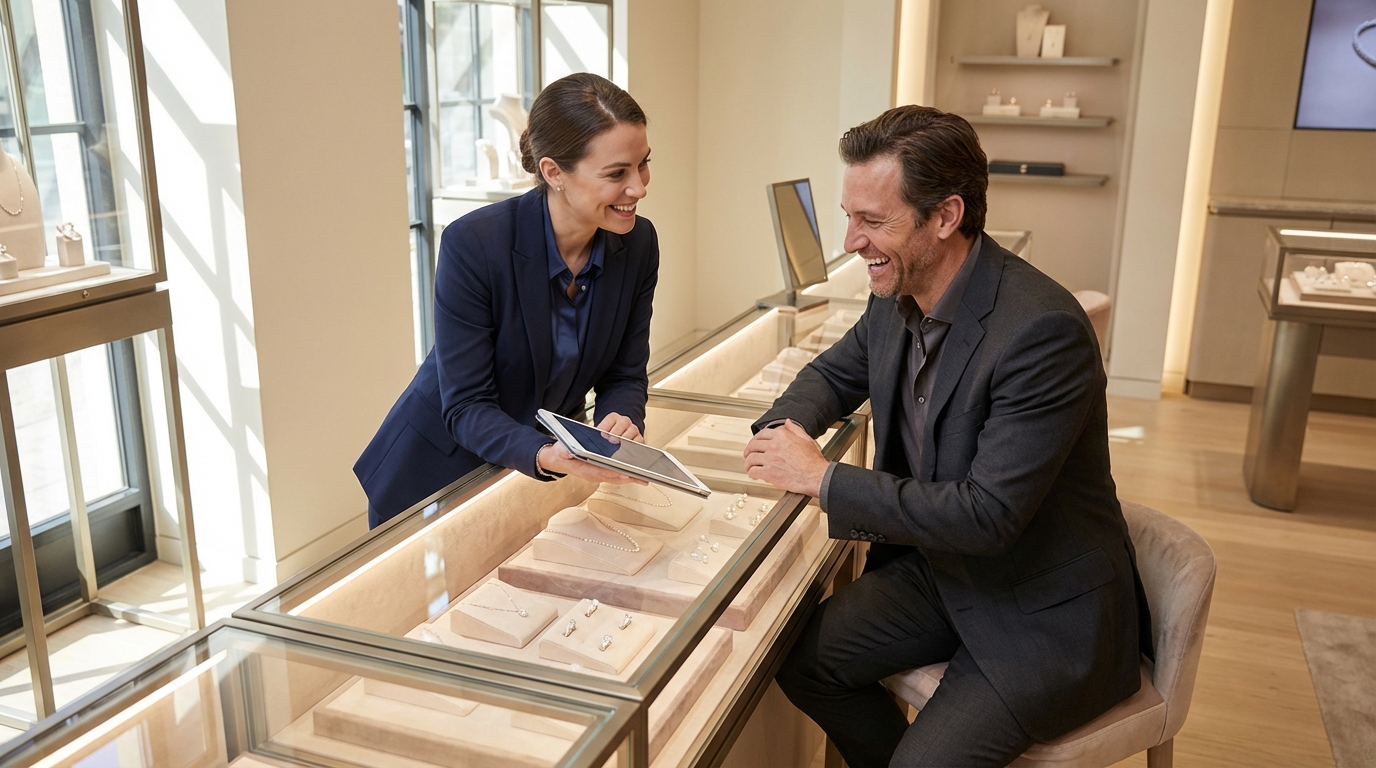For nearly three decades, Pickett Brothers Jewelers has been a fixture in Jacksonville, Florida. Known for its custom designs, diamond expertise, and deeply personal customer service, the store is a family business in every sense. The business is co-owned by husband and wife Len and Dawn Pickett and supported by a tight-knit team that wears many hats.
We sat down with Dawn, who brings a background in software development to her current marketing role, and Amy Hunnefield, Pickett Brothers’ store manager and graduate gemologist, to talk about everything from evolving communication styles to standout events—and how the right technology helps them do more with less while staying true to their values.
Can you tell us a little about the history of Pickett Brothers and what makes your store unique?
Dawn: We opened in 1996, so we’re celebrating our 29th anniversary this September. From the beginning, we’ve always focused on fine jewelry, especially diamonds and engagement. We’ve also watched the store evolve—especially with technology. When we opened, we were printing receipts on a dot matrix printer. Today, we’re using tools like Clientbook to reach our customers with relevant, timely messages that keep our store top of mind.
Amy: I joined the team about eight years ago, and over that time, we’ve really leaned into diamonds and custom design as our specialty. It’s been exciting to watch how technology helps us market smarter and connect with our customers in more personal ways.
What are your roles in the store’s day-to-day operations?
Amy: I’m the store manager, so I oversee everything that happens on the sales floor—sales, inventory, repairs, appraisals, and operations. I’m also our only GIA Graduate Gemologist, so anything related to gem IDs or appraisals goes through me. I help with custom design, although our amazing teammate Rachel runs most of that now.
Dawn: I retired from a career in software development two years ago and now manage our marketing and social media. I also handle the store’s books. It’s truly a partnership with my husband and the team, and I love being able to use my tech background to support the store in new ways.
Has your tech background changed how you approach business?
Dawn: Absolutely. I’ve always viewed technology as a tool to simplify processes and give our staff more time to focus on customers. Clientbook, for instance, lets us communicate the way customers prefer, especially with texting. It has streamlined everything from birthday reminders to repair notifications.
Do you see a difference in how different age groups respond to texting?
Amy: We definitely do. The younger generation obviously loves texting, but we’re seeing older customers get on board too. They’re already texting with their grandkids, so when they realize they can do the same with us—ask a question, schedule a repair, approve a custom piece—they love the convenience. It saves them time and extra trips to the store.
Have there been any standout text marketing campaigns?
Dawn: One that really took off was in July when we promoted same-day ring sizing. We sent a mass text and email, and the response was immediate. People didn’t just ask about sizing—they reached out about other services too. It reminded us how important it is to stay top of mind.
Amy: That campaign was our most successful to date. Five minutes after the text went out, the phone started ringing. We tripled our repair business in about two and a half weeks. We had to push some jobs out by a week or two just to keep up. It showed us just how effective a well-timed, clear message can be.
How do you measure success when it comes to marketing?
Dawn: We look at the full picture: engagement, replies, email reads, foot traffic, and sales. I like checking into Clientbook to see how many responses we’re getting. But even when a message doesn’t lead to a direct sale, we know it’s keeping us top of mind. Someone might text back about a different service they were meaning to ask about—that’s a win in my book.
Has Clientbook changed how you communicate with customers?
Amy: 100%. When I first started, we had to call hundreds of customers manually for events. We tried another texting program at one point, but it wasn’t intuitive and didn’t allow for individual conversations. Clientbook changed all of that. Especially with custom work. Now I can send 360° renders via text and get approvals and payments without a second in-person visit. That’s a game-changer.
Dawn: It’s also helped us retain customers who’ve moved away. We can send photos of merchandise, text back and forth, and even take payment through the platform. But we’re also careful—we only use Clientbook with existing clients, not cold outreach.
What types of events do you host, and what have you learned from them?
Amy: Our "roaring 20s" diamond themed event was a dream come true. It brought a ton of energy into the store and was great for team morale. People were stopping by just to see what was going on and take pictures of our fun outfits. But even during COVID, we had success with events—like a lab-grown diamond event in 2020 that we promoted via text and got a strong response.
Dawn: For our events, we like to send a series of texts—one to announce it and prompt appointments, and a reminder closer to the day. We always get a handful of booked appointments just from those messages.
Amy: Our next event will be even more exciting—an artist from Shaw Luxury is coming to hand-sketch custom designs in real time for clients. That’ll be in November, just in time for the holidays.
What do you want first-time clients to feel when they walk into your store?
Amy: Family. That word is at the core of who we are. We want people to feel at home—like they could grab a soda, hang out, and be part of our story whether or not they buy something. One in every five reviews probably uses the word “family.” That means a lot to us.
Why are reviews so important to you?
Dawn: Reviews are organic. They’re not written by us—they’re written about us. They reflect our customers' real experiences. You can’t put a price tag on that kind of trust-building. Today, someone can even summarize your reviews with AI. So it’s critical that your real voice comes through in those reviews.
When we switched from nightly syncing to ongoing integration with The Edge and Clientbook, we were able to send review requests right after checkout. Since making that change, we’ve gone from under 500 Google reviews to over 620.
What’s one of the biggest challenges of owning a jewelry store today?
Dawn: Staying adaptable. Consumer habits shift, trends change, and technology evolves. You have to be willing to adjust your business model. In the past, we did Pandora and gold buying. Now we’re focused on diamonds and lab-grown. You have to see change as an opportunity, not a threat.
Amy: The learning never stops. I started part-time doing social media, and now I’m a full-time manager and GG. This industry is constantly evolving—whether it's new products, new tools, or new people. There’s always something to learn.
On the flip side, what’s the most rewarding part of your job?
Amy: It depends on the day! Sometimes it’s just making someone smile. Other times, it’s knowing you played a role in a milestone moment—like an engagement. This industry checks every box: emotional connection, personal growth, financial opportunity, meaningful work. If you’re looking for purpose, you’ll find it here.
Final thoughts
After 29 years in business, Pickett Brothers continues to grow—not just in numbers, but in how they show up for their community. Whether it’s responding to customer texts in real time, tripling repair volume with a well-timed campaign, or hosting unforgettable events, Dawn, Amy, and the rest of the Pickett Brothers team strike the perfect balance between tradition and innovation.





